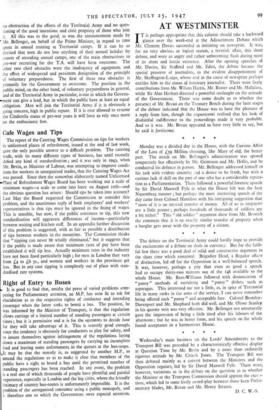AT WESTMINSTER
IT is perhaps appropriate that this column should take a backward glance over the week-end at the Adjournment Debate which Mr. Clement Davies succeeded in initiating on newsprint. It was, for no very obvious or logical reason, a feverish affair, this short debate, and wore an angry and rather unbecoming flush during most of its short and hectic existence. After the opening speeches of Mr. Davies, Sir Stafford and Mr. Eden, the debate became the special preserve of journalists, to the evident disappointment of Mr. Skeffington-Lodge, whose zeal in the cause of newsprint perhaps entitles him to the status of honorary journalist. There were lively contributions from Mr. Wilson Harris, Mr. Baxter and Mr. Mallalieu, while Sir Alan Herbert directed a powerful onslaught on the attitude of the Government. There was some doubt as to whether the presence of Mr. Bevan on the Treasury Bench during the later stages of the debate indicated that the House was to have the pleasure of a reply from him, though the cognoscenti realised that his look of disdainful indifference to the proceedings made it very probable. And so it was. Mr. Bevan appeared to have very little to say, but he said it fortissimo.
Monday was a divided day in the House, with the Curious Affair of the Loss of £59 Million choosing, like Mary of old, the better part. The attack on Mr. Bellenger's administration was opened temperately but effectively by Mr. Grimston and Mr. Hollis, and he conducted his defence in person. Mr. Bellenger addressed himself to his task with evident sincerity ; nd a desire to be frank, but with a curious lack of skill on the part of one who has a considerable reputa- tion as a Parliamentarian. There followed a powerful forensic speech by Sir David Maxwell Fyfe in what the House felt was the best Nuremberg manner ; but perhaps the most interesting speech of the day came from Colonel Hamilton with his intriguing suggestion that "most of it is an internal transfer of money. All of us as taxpayers are a little poorer ; perhaps hundreds of thousands of soldiers are a bit richer." This " old soldier " argument drew from Mr. Beswick the comment that it is an exactly similar transfer of property when a burglar gets away with the property of a citizen.
The debate on the Territorial Army could hardly hope to provide the excitements of a debate on deals in currency. But for the faith- ful few there was a good deal of solid and constructive argument in the short time which remained. Brigadier Head, a Regular officer of distinction, led off for the Opposition in a well-balanced speech. It was, however, perhaps a pity that even so good a speech had to occupy thirty-two minutes out of the 148 available to the whole House. Mr. Rees-Williams followed with denunciation of " pansy " methods of recruiting and " pansy " dishes, such as asparagus. This interested me not a little, as, in spite of Territorial life in many ranks in the arms of the service, I can never remember being offered such " pansy " and acceptable fare. Colonel Bromley- Davenport and Mr. Shephard both did well, and Mr. Oliver Stanley in his quieter vein was very effective. Mr. Bellenger not unnaturally gave the impression of being a little tired after his labours of the afternoon ; but he was in better form, and his speech on the whole found acceptance in a harmonious House.
* *
Wednesday's main business on the Lords' Amendments to the Transport Bill was preceded by a characteristically effective display at Question Time by Mr. Bevin and by a more than ordinarily rigorous attitude by Mr. Creech Jones. The Transport Bill was then debated mainly as a contest between the Ministers and the Opposition regulars, led by Sir David Maxwell Fyfe. There were, however, variations as in the debate on the question as to whether the Minister or the Transport Commission should appoint the exec- fives, which led to some lively sword-play between those keen Parlia- mentary blades, Mr. Bevan and Mr. Henry Strauss.
D. C. W.-S.


































 Previous page
Previous page